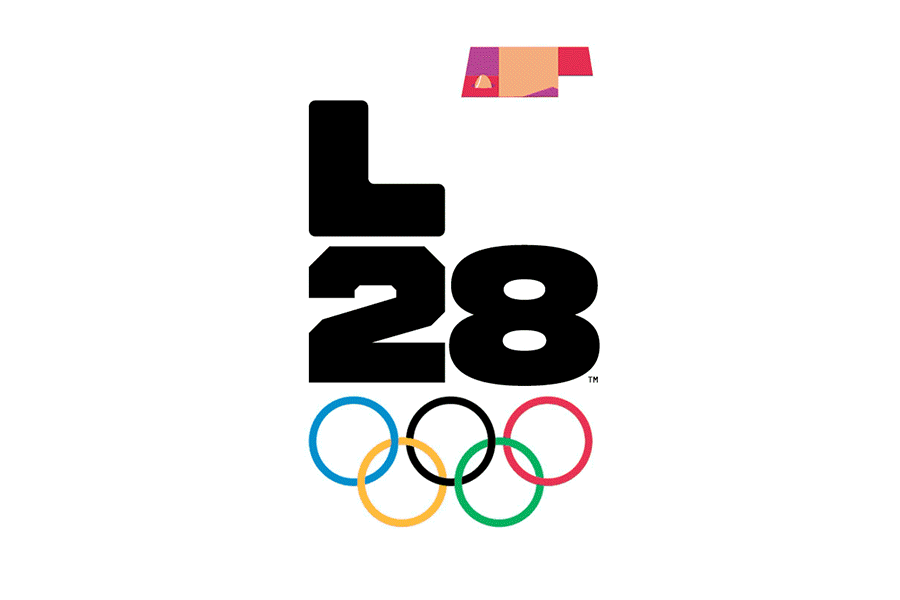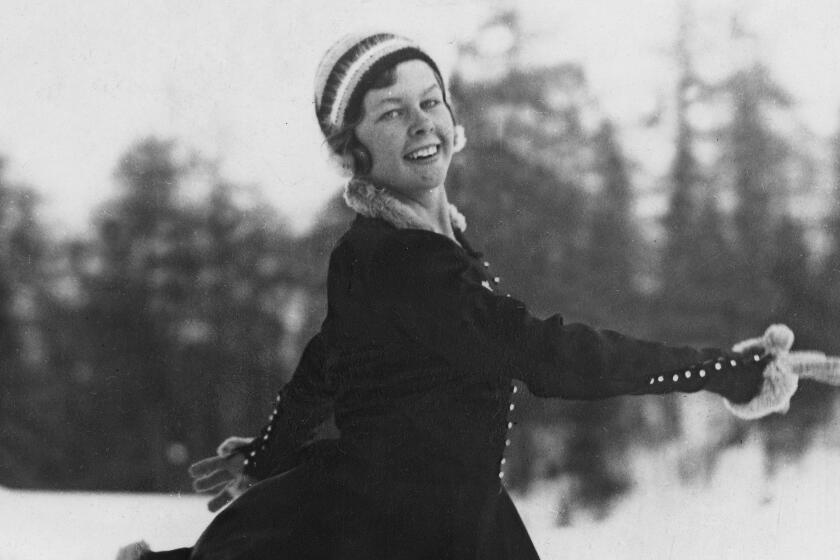Barcelona Owes Debt to L.A.
An Olympics is like no other sporting event in the world. It used to be a sleepy little series of track meets as immortalized in the film, “Chariots of Fire.” The competition was pretty much restricted to the sons of riches from places such as Oxford, the Sorbonne, Heidelberg, Yale and Princeton, undergraduates for whom pater could afford the considerable travel expense.
Nobody made any money off Olympic Games. It was considered declasse to do so.
Los Angeles twice saved the Games.
In 1932, the world was broke, the Depression was in full swing and the “Olympics” were shaping up as nothing more than a dual meet between USC and Stanford. Other countries couldn’t afford the boat fare nor the housing expense.
So Zack Farmer and the L.A. Olympic organizers hit upon the extraordinary idea of building the first Olympic village to house the athletes. Thus, they not only put up the first public housing, they bought the products of the visiting countries, from coffee to wine, to defray the costs of travel.
Until then, Hitler, new to power, had been on the point of turning back the 1936 Games, but the Olympic village idea appealed to him as a potential troops barracks. And Hitler turned the Games into chauvinist pageantry.
He correctly perceived them as a boon to tourism and intended them as an advertisement for the superiority of fascism. The propaganda backfired when the master race couldn’t keep up with competitors he described as “black auxiliaries.” And the tourists he ultimately attracted to Berlin were wearing Red Army uniforms.
Avery Brundage, when he headed the International Olympic Committee, always deferred to entrenched aristocracy in picking host cities for his simon-pure Games. In the postwar era, he put the Games three times in places that had been Axis enemies of democracy--first Rome, then Japan, then Munich, the cradle of Nazism.
The symbolism eluded Brundage, who always opted for a crowned head--or a guy with a “Sir” or “Von” or “Your Eminence” in front of his name. If you weren’t in Burke’s Peerage or the Almanach de Gotha, you didn’t make Brundage’s guest list. His IOC had more monocles than the German general staff.
Violence came to the Olympics at Mexico City in 1968. Brundage had given the games to the Mexican metropolis reluctantly, and when the students there demonstrated against them, he was quick to react by threatening to pull the Games out of Mexico and transferring them to Los Angeles or Montreal.
The Mexican government’s response was quick and cruel. First, the federales authorized a student demonstration in the Plaza of the Three Cultures in the middle of the city. When the students gathered, they were shot down from the balconies overhead by squads of white-gloved Guardia Civil marksmen, obviously assembled for the purpose. Eyewitnesses dispute the carnage, but the upshot was mass murder. Either 48 were killed, as the government admitted--or 200, as the attending British press estimated.
Either way, the incident quelled the demonstrations, but the Mexico Olympics gained importance for a reason other than sports: For the first time, the Games were used as a forum for special-interest protest. On the victory stand, American sprinters Tommie Smith and John Carlos raised black-gloved fists to call world attention to what they termed unfair treatment of black citizens in America.
The activity made big, bold headlines all over the world, and the lesson was not lost on political terrorists everywhere. At the very next Olympics, at Munich, peaceful social protest escalated into kidnaping and murder. Two Israeli athletes were killed immediately by Palestinian terrorists who invaded the athletes’ village, and nine more were taken hostage, bound and later killed in an airfield shootout between police and the terrorists.
If the lesson of Mexico was not lost on Middle East terrorists, however, neither was it lost on corporate America. It, too, was impressed by the power of the Olympics to capture attention. If it sold politics, it could sell shoes.
But so long as Avery Brundage was in charge, world commerce had to keep its distance. Brundage got so apoplectic at the notion of advertising, he made the winter Olympians mask their ski labels. He showed shoe salesman the door. Brundage didn’t want anybody but himself to make money out of the Olympics.
He even went so far as to try to require every Olympian to sign a contract guaranteeing that he would never in future endeavor to capitalize or make a living on his Olympic reputation. This meant, presumably, that an Olympic walker could never become a letter-carrier or waiter. A swimmer could never become a lifeguard, and a pistol shooter could never become a cop. Or, for that matter, a robber.
Brundage’s idea never caught on. Under his holier-than-thou philosophy, the Games all but foundered in 1976 when Montreal--still trying to run the kind of Olympics Avery envisioned--went so deep in the hole on cost overruns that the city is still paying off the $1 billion the Games cost the taxpayers.
Moscow paid the ultimate accolade to the power of the Olympics to influence world opinion, which is to say the U.S. President, Jimmy Carter. He thought if he boycotted the Moscow Games, the Red Army would be shamed into getting out of Afghanistan. Russia thought he was kidding. So did the rest of the world. Presumably, if that didn’t work, he was going to close Disneyland.
Nobody wanted the Olympic Games thereafter. Not Los Angeles, which had been awarded them, nor any other country, which could have had them for a song.
The Los Angeles City Council voted to orphan the Games, put them on somebody else’s doorstep with a note. They voted not one red cent of city money to bankroll them.
So they dumped the ’84 Games into the lap of Peter Ueberroth, a onetime water polo player who had made millions in the travel business.
He could have said, as did the French general of World War II, “They have handed me a disaster,” but Ueberroth knew something that had never occurred to an Olympic organizer before: The Olympics was a one-of-a-kind commodity that came around only slightly more often than Halley’s comet and therefore had an intrinsic worth far in excess of what it had been given away for.
And it had a world--not a local--audience. It was the next-best thing in product identification to God, country and Mother.
He sold it like a Rembrandt, not calendar art. He convinced corporate America--and corporate Japan--that it would be the most wholesome tie-in for their products this side of the lives of the saints. He made it American business’ finest hour. He played hardball with the Olympic pooh-bahs.
When he got McDonald’s to build a swimming stadium, the purists protested, “You’re using the Olympics to sell hamburgers!”
Ueberroth countered sweetly, “I’m using hamburgers to keep swimming in the Games.”
Ueberroth kept swimming in the Games. And he kept the Games swimming. He made $300-million profit. He showed the politicians that the Olympics didn’t have to be on welfare.
So, Los Angeles had saved the Games a second time. Peter Ueberroth had put the Games in the window with a price tag--and made the Olympics a billion-dollar proposition.
Barcelona is inheriting not a bankrupt, discredited medieval relic but a vital, valuable festival with Dream Teams, world’s fastest humans, world’s longest jumpers, world’s greatest athletes. Hotels are full, subways are jammed, the world’s cameras are trained on this romantic corner of Catalonia, whose relationship to the rest of Spain is about what Croatia’s is to Serbia.
For two weeks, it won’t matter. The reign in Spain is absolute. Even if it stays mainly in Barcelona, it can still bask in the world spotlight. The Olympics are alive and well and living in the land that bankrolled Columbus, beguiled Hemingway and for whom sponsorship can give new meaning to the term Spanish Armada.
More to Read
Go beyond the scoreboard
Get the latest on L.A.'s teams in the daily Sports Report newsletter.
You may occasionally receive promotional content from the Los Angeles Times.





